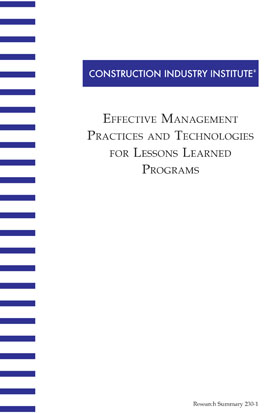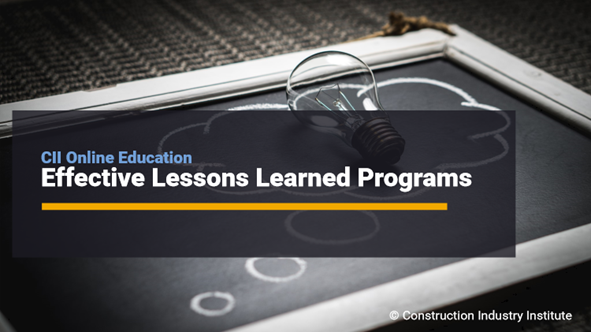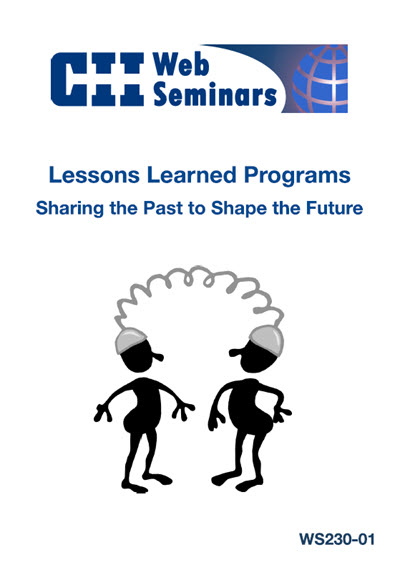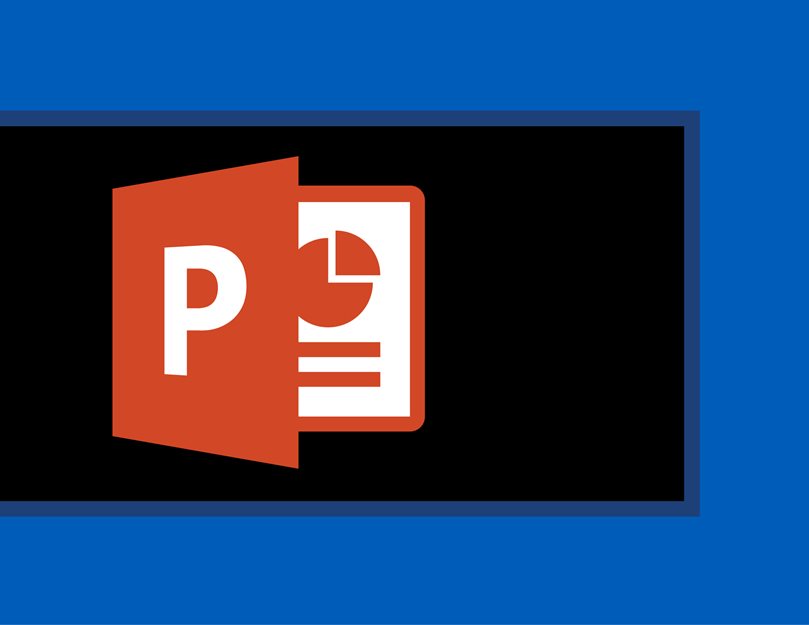
Effective Management Practices and Technologies for Lessons Learned Programs
Many organizations in the engineering and construction industry recognize the importance of a Lessons Learned Program (LLP) as a vital asset that plays an essential role in knowledge management systems. In these organizations, project team members generally acquire new knowledge as their careers progress. This knowledge, which includes both successes that organizations want to repeat and problems they do not want repeated, may not be routinely disseminated throughout the organization. The value of optimizing the dissemination of this gained knowledge warrants spending resources on a formal lessons learned program.
CII formed the Effective Management Practices and Technologies for Lessons Learned Programs Research Team to investigate the current status, implementation, and performance of lessons learned programs in both its membership and beyond. During the course of its work, it conducted over 100 surveys, 10 case study assessments, and involved 70 organizations. It defined a “lesson learned” as: knowledge gained from experience, successful or otherwise, for the purpose of improving future performance.
Among its findings, the research team observed that lessons learned programs today are more prevalent and formal than during CII’s previous research in 1998. Formal lessons learned programs are typically organization-wide systems with lessons collected at the time they occur and with a dedicated coordinator to oversee the effort. No commercially available lessons learned computer applications were identified. Lessons learned programs can present a variety of legal concerns to an organization if not addressed proactively. All respondent organizations recognize the inherent value of lessons learned; however, no organization has successfully quantified the direct value of their LLP.
Key characteristics of lessons learned programs were assessed and measured, leading to a characterization of the maturity state of all studied organizations. The research team developed a Lessons Learned Maturity Model Matrix for assessing an organization’s current LLP using seven characteristics: Leadership, Lesson Collection, Lesson Analysis, Lesson Implementation, Resources, Maintenance and Improvement, and Culture. The corresponding assessment results will allow an organization to understand its current status versus a sample of 36 CII member organizations and to plan improvement. Details of this tool and improvement methods are discussed in this summary and provided in depth in CII Implementation Resource 230-2, Implementation of Lessons Learned Programs.
In summary, every organization should move forward in developing or improving a lessons learned program. The reader should consider the following tenets of success in developing or managing its LLP:
- Leadership, top-level and tactical, is probably the most important prerequisite for success of these programs.
- Organizations should become “teaching” organizations, rather than organizations that only collect or learn from the past in an ad hoc or passive manner.
- Organizations should adopt an active implementation strategy for ensuring that lessons are used.
- Although technology is important in developing and using an LLP, the importance of organizational culture should not be underestimated.
- The quality of lessons learned is more important than the quantity of lessons in the database.
- Both owners and contractors can benefit from lessons learned programs. Necessarily, the captured lessons learned will be focused in different areas based on the business needs of the organization.
LLPs are prevalent among many construction organizations with 94% of the evaluated organizations using some type of lessons learned process to facilitate improvement within their organizations. (RS230-1, p. 5)
An organization benefits from lessons learned most when they follow a documented, formalized three-step process; collection, analysis, and implementation. Implementation is typically less advanced than collection and analysis.
- Collection involves gathering data and information on the experiences of individuals and teams in the organization. Collection can occur at multiple stages of project execution.
- Analysis can be performed by a team or a subject matter expert (SME). This step is necessary to ensure the information gathered is relevant, correct, and easily understood.
- Implementation can involve changes in practices and procedures or changes in the project execution. Lessons learned should be implemented quickly to ensure they are helpful for the organization.
Every organization should move forward in developing or improving a lessons learned program. (RS230-1, p. 22)
- Leadership, top-level and tactical, is the most important prerequisite for success of these programs.
- Organizations should become “teaching" organizations, rather than organizations that only collect or learn from the past in an ad hoc or passive manner.
- Organizations should adopt an active implementation strategy for ensuring that lessons are used.
- Although technology is important in developing and using an LLP, the importance of organizational culture should not be underestimated.
- The quality of lessons learned is more important than the quantity of lesson in the database.
- Both owners and contractors can benefit from lessons learned programs. Necessarily, the captured lessons learned will be focused in different areas based on the business needs of the organization.
There are 7 key areas that affect the success of lessons learned programs:
- Leadership
- Lesson collection
- Lesson analysis
- Lesson implementation
- Resources
- Maintenance and improvement
- Culture
All of these areas must be addressed by an organization to effectively implement a lessons learned program. These 7 characteristics are the basis for the Maturity Model. (RS230-1, p. 17).



